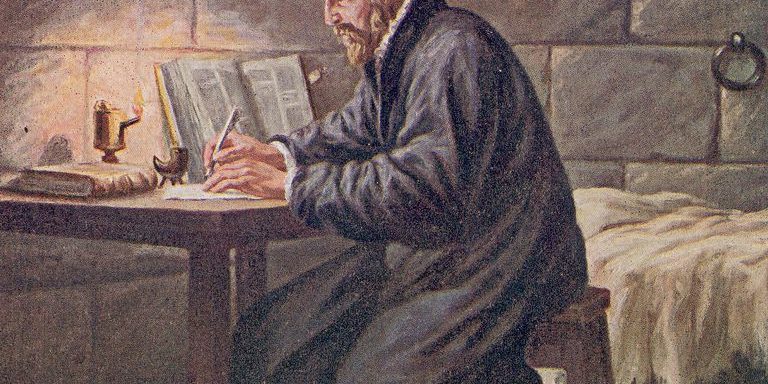
Joy and the Protestant Reformation
“I’m writing a book on joy and the Reformation.” His raised eyebrows were enough to tell me he was skeptical. “What’s joy got to do with the Reformation?” It was one of those questions that is really a statement.
Joy is not something many people readily associate with the Protestant Reformation. Courage, yes. Controversy, yes. Truth, maybe. But not joy. Joy is a long way down the list when it comes to most people’s perception of John Calvin.
A Belly Laugh
Yet consider this from William Tyndale, one of the key figures in the English Reformation. In 1526 Tyndale published the New Testament in English. It was his second attempt to do so. The first time around, he had to flee when the authorities raided the press on which it was being printed. He was living in exile and would eventually be martyred for his passion to make an English Bible available to every ploughboy in the land. He included a preface (much of it ripped from Martin Luther) to that first edition which he later expanded into A Pathway into the Holy Scripture. Here’s what he said about the gospel and the Bible.
What we call “the gospel” is a Greek word that signifies good, merry, glad and joyful tidings, that make a man’s heart glad, and make him sing, dance, and leap for joy … Now the wretched man (who is wrapped in sin, and is in danger to death and hell) can hear nothing more joyous then such glad and comforting tidings of Christ. As a result, he cannot but be glad and laugh from the low bottom of his heart, if he believes that these tidings are true.
For Tyndale, the Reformation brought news that makes people sing and dance and leap for joy. It is a message that makes a man laugh from “the low bottom of his heart.” I guess today we might say “a belly laugh.” What is this good news? Tyndale says it is “[Christ’s] life, through which he swallowed and devoured up death; his righteousness, through which he banished sin; his salvation, through which he overcame eternal damnation.”[1]
The Reformation as a Rediscovery of Gospel Joy
There’s a sense in which the young Luther was the one person who took Medieval Catholic theology seriously. He really believed it and it crushed him. He would spend hours confessing to his superior in the Augustinian order, and then come rushing back with some new misdemeanor he had remembered. At one point his superior said: “Look here, Brother Martin. If you’re going to confess so much, why don’t you go do something worth confessing? Kill your mother or father! Commit adultery! Stop coming in here with such flummery and fake sins!”[2]
But Luther could find no rest for his soul in the theology he had been taught by the church. It spoke of faith and grace. But faith was understood more like our word “fidelity.” Faith was our loyalty to God that might perhaps earn his favor. And grace was like a shot of adrenalin, a kind of spiritual boost to help us live the Christian life, that you received through the sacraments. But still, it was down to you to earn enough merit before God. No one could have hope or peace before God. The very idea was errant presumption.
At first what Luther found in the Scriptures only made matters worse. He was particularly fixated on Romans 1:17: “For in the gospel the righteousness of God is revealed – a righteousness that is by faith from first to last, just as it is written: ‘The righteous will live by faith.’” In Greek, Latin, and German, there is only one word for the two English words “righteousness” and “justice”. So Romans 1:17 says the gospel reveals the justice of God. For Luther that meant only one thing: the scrupulous justice by which God judges sinners. And, given what he knew of his own heart, that could only lead to condemnation. “Isn’t it enough that we miserable sinners, lost for all eternity because of original sin,” he said to himself, “are oppressed by every kind of calamity through the Ten Commandments? Why does God heap sorrow upon sorrow through the Gospel and through the Gospel threaten us with his justice and his wrath?”[3]
Luther’s breakthrough moment came when he connected “the justice of God” in Romans 1:17 with the rest of the verse, and realized this justice or righteousness is a gift that God gives and which we received by faith. As Romans 1:17 puts it: “The righteous will live by faith.”
Listen to how Luther describes the impact of this realization: “All at once I felt that I had been born again and entered into paradise itself through open gates … I exalted this sweetest word of mine, ‘the justice of God,’ with as much love as before I had hated it with hate. This phrase of Paul was for me the very gate of paradise.”[4] The weight of condemnation was lifted. The unachievable need to earn merit before God was replaced with the perfect achievements of Christ. The unending task of self-justification was replaced with the finished work of the cross and resurrection. The joy that was rediscovered at the Reformation was not simply sins forgiven, but a relationship with God. Click To Tweet
A Bride’s Delight
The joy that was rediscovered at the Reformation was not simply sins forgiven, but a relationship with God. Listen, for example, to Luther speaking about righteousness in Christ.
Faith unites us with Christ in the same way that a bride is united with her husband. As a result of everything they have, they now hold in common, the good as well as the evil. So we glory in whatever Christ has as though it were ours. And whatever we have, Christ now claims as his own. And if we compare this exchange then we shall see benefits that cannot be calculated. Christ is full of grace, life, and salvation. The soul is full of sins, death, and damnation. Now let faith come between Christ and us. Our sins, death, and damnation now belong to Christ’s, while his grace, life, and salvation are now ours. For if Christ is a husband, he must take on himself the things which belong to his bride. And he must give her the things that are his. Not only that, but he also gives us himself.[5]
Did you spot the twist at the end? Luther does an almost arithmetic calculation of what is gained and lost in the transaction of salvation. And just as you are reeling from the wonderful benefit that faith in Christ brings, he adds, “Not only that, he also gives us himself.” On her wedding day, no bride is totting up her share of her husband’s bank balance. She’s starring delightedly into the eyes of her beloved. And so to the Christian the greatest benefit of all is Christ himself.
A Child’s Confidence
Last year I read through John’s Calvin’s great work Institutes of the Christian Religion with a young man in my congregation. What struck me most rereading it was the way Calvin repeatedly emphasizes God as our Father.
You probably start most of your prayers, “Dear Father” or “Father God” or with some other reference to God as Father. Calvin invites us to step back for a moment and consider what an amazing thing it is to call God “Father.”
With what confidence would anyone address God as “Father”? Who would break forth into such rashness as to claim for himself the honor of a son of God unless we had been adopted as children of grace in Christ? He, while he is the true Son, has of himself been given us as a brother that what he has of his own by nature may become ours by the benefit of adoption if we embrace this great blessing with sure faith.[6]
If by faith we are in Christ, says Calvin, then what he has by nature we now have by adoption. All the love he receives from God the Father and all the access he enjoys is now ours in him. God the Father loves us with the same love he had for his Son, Jesus.
But even with these privileges, we would hesitate to come before God. So God in his love has also given his Spirit so that we might experience the reality of adoption that Christ has created – so that we might know we are loved by God. This is how Calvin puts it: “But because the narrowness of our hearts cannot comprehend God’s boundless favor, not only is Christ the pledge and guarantee of our adoption, but he moves the Spirit as witness to us of the same adoption, through whom with free and full voice we may cry, ‘Abba, Father.’”[7]
It is the lack of this relationship  with God the Father that explains the focus in Catholic spirituality on the Virgin Mary. In Catholic theology, God remains distant, severe and aloof. It is hardly surprising then that Mary steps in, as it were, to be the approachable face of God. But this need evaporates with the Reformation.
with God the Father that explains the focus in Catholic spirituality on the Virgin Mary. In Catholic theology, God remains distant, severe and aloof. It is hardly surprising then that Mary steps in, as it were, to be the approachable face of God. But this need evaporates with the Reformation.
We no longer think of ourselves as slaves needing to come to God through an intermediary. Now we see ourselves in Christ as sons and daughters of God, welcomed like the returning prodigal. Fear is replaced by confidence; dread is replaced by joy.
Endnotes
[1] Henry Walter (ed.), Works of William Tyndale, Parker Society, 1848-1850, Banner of Truth, 2010, 1.8-9, 11. I have minor changes to update the language and punctuation.
[2] Cited in Timothy George, Theology of the Reformers, Apollos, 1988, 65.
[3] ‘Martin Luther Discovers the True Meaning of Righteousness’ from the Preface to The Complete Edition of Luther’s Latin Works (1545), trans. by A. Thornton from ‘Vorrede zu Band I der Opera Latina der Wittenberger Ausgabe, 1545’ in Luthers Werke in Auswahl, de Gruyter, 1967, Vol. 4, 421-428.
[4] ‘Martin Luther Discovers the True Meaning of Righteousness’ from the Preface to The Complete Edition of Luther’s Latin Works (1545), trans. by A. Thornton from ‘Vorrede zu Band I der Opera Latina der Wittenberger Ausgabe, 1545’ in Luthers Werke in Auswahl, de Gruyter, 1967, Vol. 4, 421-428.
[5] Adapted from Martin Luther, On Christian Liberty, 1520.
[6] John Calvin, Institutes of the Christian Religion, ed. John T. McNeill, trans. Ford Lewis Battles, Library of Christian Classics 20–21 (Philadelphia: Westminster, 1960), 3.20.36-37.
[7] John Calvin, Institutes of the Christian Religion, ed. John T. McNeill, trans. Ford Lewis Battles, Library of Christian Classics 20–21 (Philadelphia: Westminster, 1960), 3.20.36-37.

